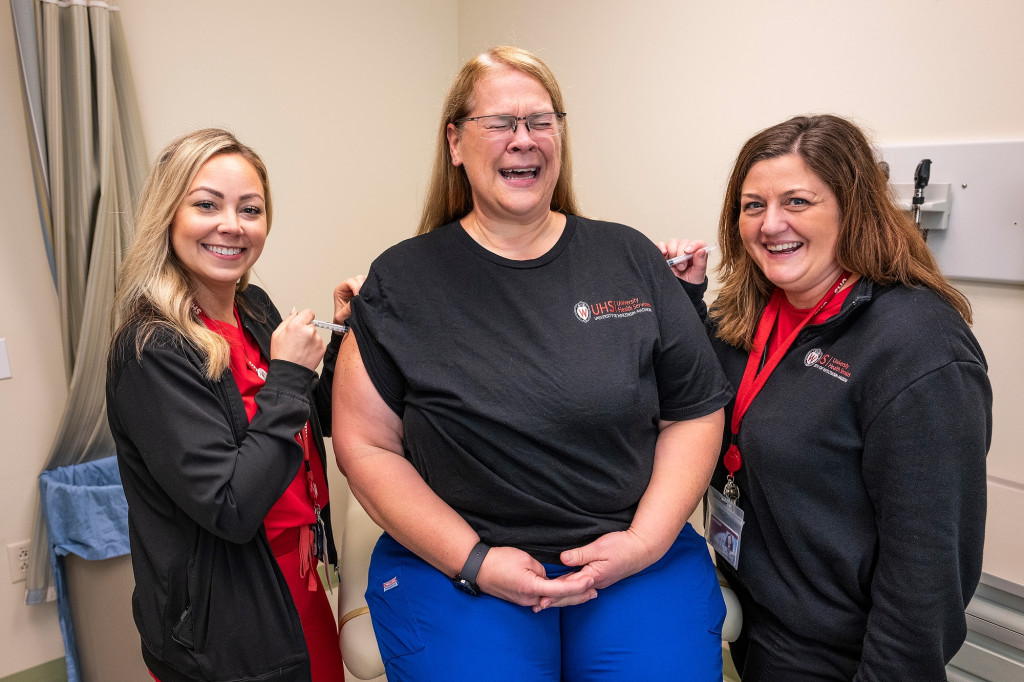Behind-the-Scenes Badgers: Three nurses keeping UW happy, healthy and vaccinated
Editor’s note: Behind-the-Scenes Badgers highlights UW employees who perform interesting, essential and sometimes unseen jobs on campus.

Nurses Kelly Yahn (left) and Jenny Kind (right) playfully pretend to administer vaccines to their colleague and fellow nurse Sally Lynd (center). The three nurses recently staffed COVID-19 and influenza vaccination clinics on campus. Photo: Jeff Miller
The Badgers: Jenny Kind, Sally Lynd and Kelly Yahn
The job: Registered nurses with University Health Services who provide additional vaccine support to COVID-19 and flu operations.
Since the pandemic hit, nurses have spent much more time giving vaccine shots — what are your feelings about your role in helping stem the spread of COVID-19 and preventing disease?
The pandemic brought a rollercoaster of emotions to both patients and medical providers, including frustration, pride and uncertainty. A nurse’s job is to take care of patients and educate them. During those periods of uncertainty, providing COVID-19 vaccinations was one way we could care for students and employees.
From where we were in 2020 to today, it’s amazing to see the reduction in hospitalizations and serious illness due to vaccinations. It was a very gratifying moment in early 2021 when we were able to give the first COVID-19 vaccines to students and employees.
We are proud to be part of a campus community that, year after year, has a high rate of vaccinated students, which contributes to keeping all of us safe and healthy. Whether it is giving a COVID-19 vaccine or an annual flu vaccine, it’s rewarding to know we are helping to keep people healthy.
How many shots do you give on your busiest days during flu or COVID vaccination clinics, and do you have any physical or mental effects on those days, like sore fingers?
On a busy day, we may vaccinate 100 or more people, which can lead some fatigue from standing a lot as well as a sore throat from talking to so many people! In 2016, UHS nurses helped to vaccinate more than 20,000 students against meningococcal disease in about one week, which did lead to some sore fingers.
If a patient seems nervous about the shot, how do you help them relax?
First and foremost, we talk to the patients to see if they have any questions or concerns. Not everyone enjoys getting a shot, so we approach each patient with compassion and empathy. Distraction is always a helpful technique, whether it’s asking about their major, what they’re doing this weekend or telling them a funny story.
If a shot-giving nurse were a superhero, what would that superhero be called and what would they wear?
Like all nurses, our superhero uniforms would need to be versatile and adaptable. Nurse Gadget or Captain Inoculation’s cape would be emblazoned with a syringe and vaccine vial, and it would feature magic pockets that immediately produce the tool or supply we need while giving a vaccine.
After a long day of giving shot after shot, what do you do at home to relax?
Jenny Kind: My children are involved in lots of sports, so I cheer them on, spend time with friends or catch up on my favorite Netflix shows.
Sally Lynd: I spend time with family and friends, get outdoors and make sure to get lots of quality time in with my pets Penny and Jackson.
Kelly Yahn: Carbs, carbs and more carbs! Plus a heating pad and ibuprofen.




